Nora Punzel (Nora Aigner) was our youngest speaker this year. She is an Austrian poet who has been diagnosed with Eagle-Syndrome, a rare disease that causes long-term voice loss and severe pain.
She talked about what it was like to lose her voice and to feel like she had to suffer in silence when she had so much she wanted to say. Her talk, which was one of the most personal ones at this year’s conference, reminded audience members of the privilege to be able to voice their opinions and the importance of sharing their stories with others.
Following Nora’s talk, I had the honor to connect with her and learn more about her personal experience. We had a chance to talk about what it means to live with “Eagle-Syndrome,” how Nora has become the voice of so many patients who suffer in silence, as well as her dreams for the future.
How do you feel after giving your first TED talk, especially since you were our youngest speaker this year?
Words fail to describe my feelings. I feel so honored to be part of it, among all those amazing and famous artists, scientists, and performers from all over the world. Being the youngest and not having professional skills, education, or knowledge on how to give a talk put a little extra pressure on me. But it all turned out to be such a positive experience. I got inspired by the other talks and made lovely encounters. I am really grateful!
Considering your medical condition, how much energy and work did it take, emotionally and physically, to prepare for this talk and eventually be on that stage and share your story?
In fact, it took me a lot of energy in every sense. I had the event in the back of my head since I received the invitation email. This was on the one hand a really nice motivation to improve my physical condition, but it also caused me panic attacks at night. I simply thought it was too big for me. I also couldn’t be sure, if my condition would allow me to speak on the day of the conference.
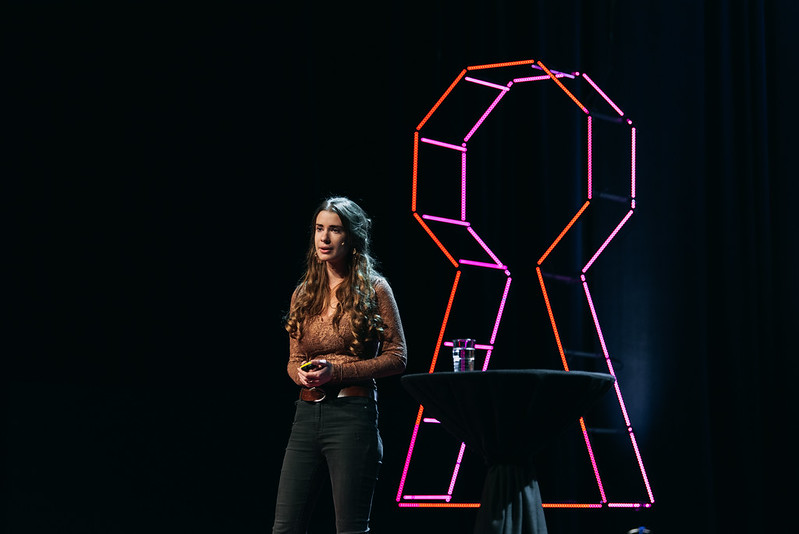
That’s why I’d already considered canceling my talk. The idea of telling my story personally on stage at a highly-notable event in front of such a huge audience got my mind so blocked, that I couldn’t even write my speech for a very long time. Even though it was my own story! But my friends encouraged me to do it.
The tough luck that my throat got inflamed exactly one week before the talk caused me a little stress. It was impossible to practice my speech because this would have increased the pain. I did daily treatments before the event and silenced for 6 days in advance. Yet, I simply couldn’t miss the chance of raising awareness for each and every one who has difficult challenges in life. That fact pushed me strongly. And it was so worth it!
You mentioned during your talk that once the symptoms of your disease started to appear, you became shy and isolated yourself from other people. Did your first diagnosis (which was the wrong diagnosis) cause you to feel even more isolated since doctors didn’t believe in your condition or your pain?
Well yes, the main problem was that I didn’t know what to tell other people (friends, relatives) anymore. I was sick, all the time, but I had no official proof for it. I had loved spending time with my friends, but it got exhausting to communicate with them because it was only possible with pen and paper. So I thought it would be better to isolate myself until I found out what was wrong with my body. Then I developed social anxiety.
How did you feel once you got the right diagnosis? Relief? Happiness? Curiosity to know more?
Relief and shock. At the very first moment, I was relieved to finally have a name for my strange symptoms. It was the end of uncertainty, and I got rid of the stigma of being insane or a hypochondriac. Yet, when I googled the Syndrome, I felt helpless again.
I couldn’t believe the extreme rareness of it, its low level of awareness, and the fact that I suddenly belonged to such a small group of patients now.
I read comments of a few other concerned people in support groups from America and was shocked by their hopelessness. There seemed to be no real quick solution to be completely pain-free.
You also mentioned during your talk that 0.16% of people in the world suffer from this disease. Since it is such a rare disease, does that make you feel, in a way, special and more connected to all people who have the same symptoms as you?
Sure, it is comforting to know that you are not alone. You feel understood by the people, who have similar problems like you, although you would prefer to have other things in common than a painful chronic illness. All the patients that I got to know at that time lived on the other end of the world- mostly in the USA. So we sadly could not share the contacts of experienced doctors or hospitals.
The exchange of information is helpful though, but at the end of the day, you have to struggle on your own.
Are you in contact with anyone else who has the same disease? How do you stay in touch?
Since I’ve started the awareness campaign, many patients have contacted me. It is amazing, that the actions really had such a wide reach. We even organized a Zoom Meeting during lockdown to chat together. It was not like I imagined a self-help-group meeting to be – you know I expected sad faces and words of frustration, but it was the opposite! We laughed so much!
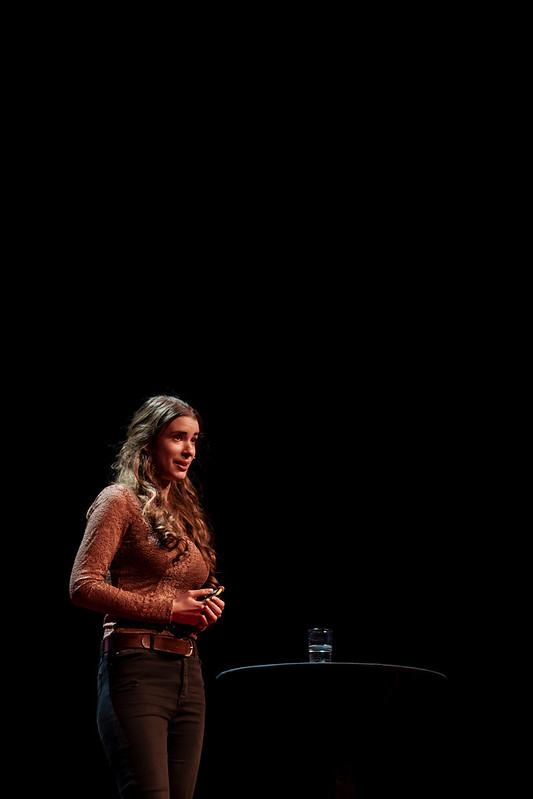
Despite sharing our pain and bad experiences with the health care system, we had real fun together. We were just 5 persons from different countries and only one lived in Austria, but everyone claimed to have felt better afterward. We were connected by heart.
You have become the voice of so many patients who suffer in silence for many years. What pushed you to raise awareness on this disease, and do you plan to continue raising awareness?
It was the despair of the patients that I met in the online groups of Facebook. And my own experience, of course. So many people suffered not only from excruciating pain but also from clinical labeling and stigmatization! They were considered as malingerers and coping with a very bad quality of life.
The huge emotional loneliness we shared made me first write my diploma thesis about these social aspects. Once I had the scientific quantitative evidence of the different kinds of difficulties you face when suffering from a disease that hardly anyone knows, I grabbed all my courage and began to make it public.
And yes, I have so many ideas to continue. Too many for my little energy, in fact. I especially love to raise awareness through art. Whether it’s via photography, films, poetry, or music. It’s a beautiful way to highlight problems while longing for a change. I also would like to cooperate with other artists or patients or artistic patients.
Since you are from Austria, can you tell us a bit more about what is being done for patients like you in Austria? You mentioned that the President of Austria supported one of your awareness campaigns. Is there government support for patients like you in Austria regarding treatment, therapies, but also help with raising awareness?
There are organizations like Pro Rare Austria that make efforts and connect patients/doctors etc. Yet, being a rare disease patient is never easy, I guess. Your special condition mostly doesn’t get enough recognition of politics, medical fields, research, but also from the social system of the state.
It’s hard to have your treatments recovered at least partly from the health insurance. The financial burden is high, and I wouldn’t have had the possibility to do certain important therapies without the financial support of my family.
Yet, I got much emotional support from others. When I went public with my story, a lot of people helped me to raise awareness, shared my message, published articles, and hence highlighted the problem of other affected patients too.
This solidarity of friends, celebrities, the president, and random strangers gave me so much strength and hope.
What would you suggest to governments here in Austria but also abroad, as the right steps towards supporting you and everyone who has the same condition as you?
I think each country has its own system and we are already quite privileged in Austria. Yet, it would be helpful if there was something like a card for rare disease patients, like it exists for people with disabilities/handicaps, simply to make some formalities easier.
Concerning the condition, it would be helpful to educate health professionals about the disease and also ask them to listen more to their patients, in order to prevent them from making false diagnoses too quickly.
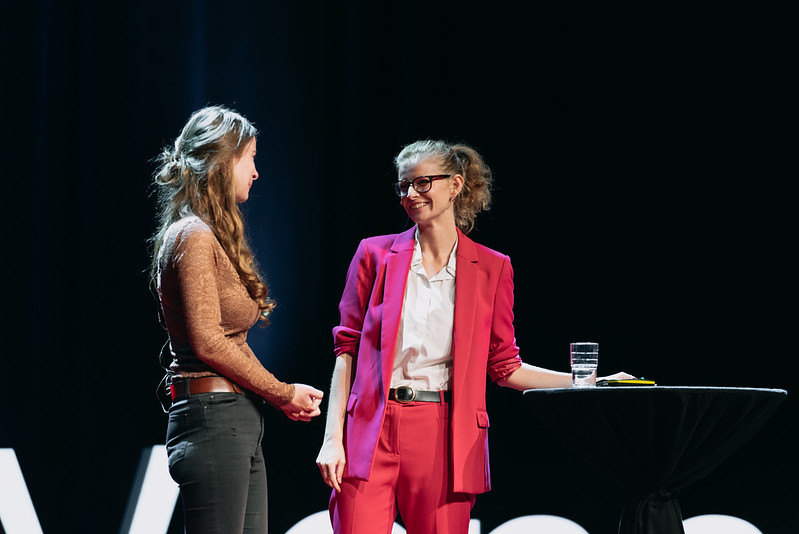
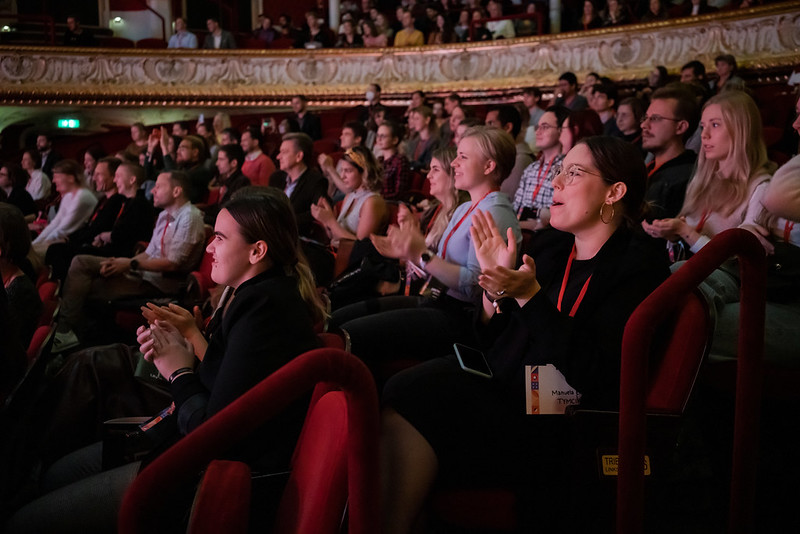
You have turned your love for teaching and singing into a new love for writing and poetry. What other hobbies have you discovered after you got your diagnosis?
This makes me smile. It reminds me that when one door closes, another one opens. I never knew that I loved writing (poetry) before my chronic illness. I also started doing hoop dance and aerial silks, although I always had been the worst sports student in school. I am still clumsy today and exhausted after a few minutes of moving, but it gives me joy and makes me forget my pain.
I would recommend that to anyone (going through a crisis): find something you are really passionate about (regardless of your mental/physical/financial limitations, beliefs, or self-doubt) and fully dive into it.
Discover new dreams, believe in them, and watch out for chances to make them come true.
What would be the first thing you would do if all the symptoms disappeared, and you regained your voice back 100%? Would you get back to singing? Anything that comes first to your mind?
Wow, it’s sad, but I never really dare to think about that… I fear the disappointment of high expectations, despite just telling you how important it is to dream (laughs). Well, I think I would tour the world. Due to my medical therapies, I am very restricted and often feel very dependent. I am longing for some freedom! I would enjoy traveling and encouraging others at the same time, maybe while writing books or singing at cozy campfires together with good people…
Here’s Nora’s full talk at TEDxVienna UNTOLD:
To keep up with Nora’s updates, visit her website here.

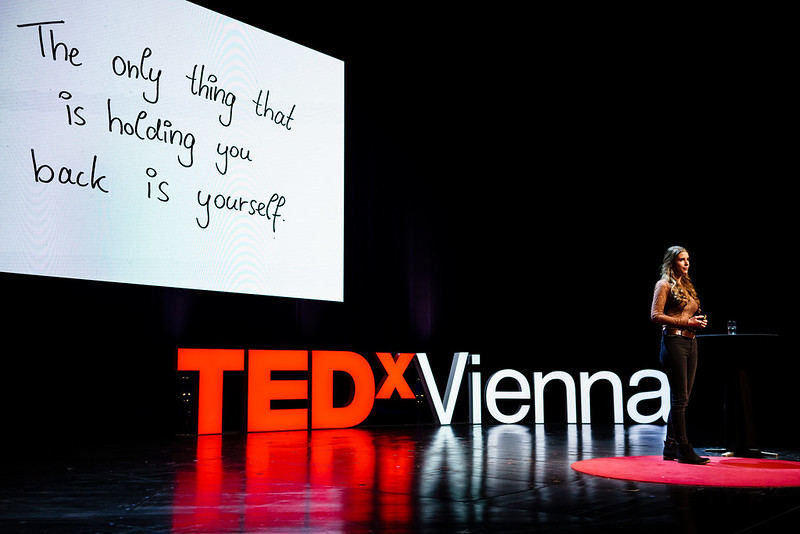
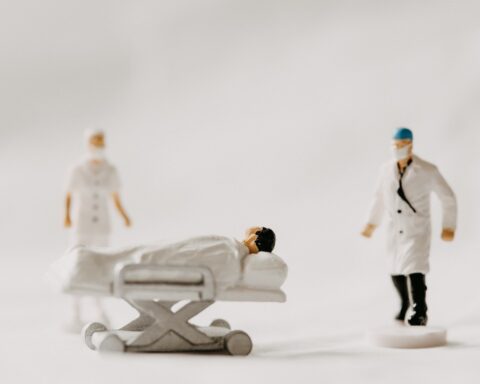

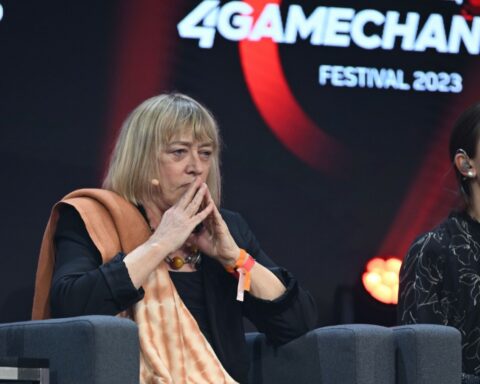

I barely know Nora, but my impression is that she is a very good person. Yes, as billions others in the world. Somewhere I read that difficulties can give meaning to life, maybe it’s her case. Anyway, I believe she is outstanding in life, and hope she can continue helping others, to live a better life, through her experiences.